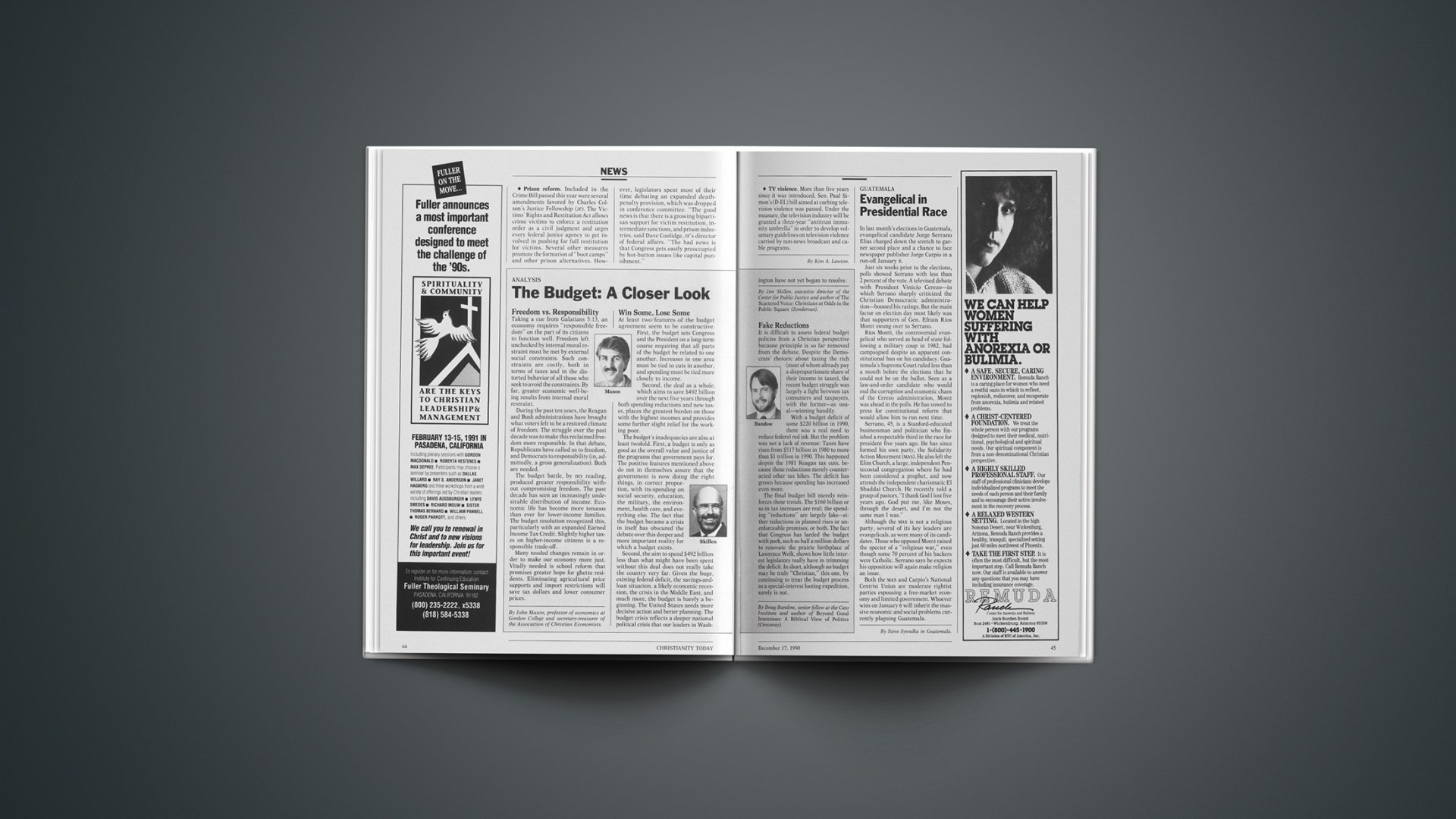Freedom Vs. Responsibility
Taking a cue from Galatians 5:13, an economy requires “responsible freedom” on the part of its citizens to function well. Freedom left unchecked by internal moral restraint must be met by external social constraints. Such constraints are costly, both in terms of taxes and in the distorted behavior of all those who seek to avoid the constraints. By far, greater economic well-being results from internal moral restraint.
During the past ten years, the Reagan and Bush administrations have brought what voters felt to be a restored climate of freedom. The struggle over the past decade was to make this reclaimed freedom more responsible. In that debate, Republicans have called us to freedom, and Democrats to responsibility (in, admittedly, a gross generalization). Both are needed.
The budget battle, by my reading, produced greater responsibility without compromising freedom. The past decade has seen an increasingly undesirable distribution of income. Economic life has become more tenuous than ever for lower-income families. The budget resolution recognized this, particularly with an expanded Earned Income Tax Credit. Slightly higher taxes on higher-income citizens is a responsible trade-off.
Many needed changes remain in order to make our economy more just. Vitally needed is school reform that promises greater hope for ghetto residents. Eliminating agricultural price supports and import restrictions will save tax dollars and lower consumer prices.
By John Mason, professor of economics at Gordon College and secretary-treasurer of the Association of Christian Economists.
Win Some, Lose Some
At least two features of the budget agreement seem to be constructive. First, the budget sets Congress and the President on a long-term course requiring that all parts of the budget be related to one another. Increases in one area must be tied to cuts in another, and spending must be tied more closely to income.
Second, the deal as a whole, which aims to save $492 billion over the next five years through both spending reductions and new taxes, places the greatest burden on those with the highest incomes and provides some further slight relief for the working poor.
The budget’s inadequacies are also at least twofold. First, a budget is only as good as the overall value and justice of the programs that government pays for. The positive features mentioned above do not in themselves assure that the government is now doing the right things, in correct proportion, with its spending on social security, education, the military, the environment, health care, and everything else. The fact that the budget became a crisis in itself has obscured the debate over this deeper and more important reality for which a budget exists.
Second, the aim to spend $492 billion less than what might have been spent without this deal does not really take the country very far. Given the huge, existing federal deficit, the savings-and-loan situation, a likely economic recession, the crisis in the Middle East, and much more, the budget is barely a beginning. The United States needs more decisive action and better planning. The budget crisis reflects a deeper national political crisis that our leaders in Washington have not yet begun to resolve.
By Jim Skillen, executive director of the Center for Public Justice and author of The Scattered Voice: Christians at Odds in the Public Square (Zondervan).
Fake Reductions
It is difficult to assess federal budget policies from a Christian perspective because principle is so far removed from the debate. Despite the Democrats’ rhetoric about taxing the rich (most of whom already pay a disproportionate share of their income in taxes), the recent budget struggle was largely a fight between tax consumers and taxpayers, with the former—as usual—winning handily.
With a budget deficit of some $220 billion in 1990, there was a real need to reduce federal red ink. But the problem was not a lack of revenue: Taxes have risen from $517 billion in 1980 to more than $1 trillion in 1990. This happened despite the 1981 Reagan tax cuts, because those reductions merely counteracted other tax hikes. The deficit has grown because spending has increased even more.
The final budget bill merely reinforces these trends. The $160 billion or so in tax increases are real; the spending “reductions” are largely fake—either reductions in planned rises or unenforceable promises, or both. The fact that Congress has larded the budget with pork, such as half a million dollars to renovate the prairie birthplace of Lawrence Welk, shows how little interest legislators really have in trimming the deficit. In short, although no budget may be truly “Christian,” this one, by continuing to treat the budget process as a special-interest looting expedition, surely is not.
By Doug Bandow, senior fellow at the Cato Institute and author of Beyond Good Intentions: A Biblical View of Politics (Crossway).










